Deutsche Telekom, a titan in the telecommunications industry, reigns supreme as the largest telecommunications provider by revenue across all of Europe. Headquartered in Bonn, Germany, this powerhouse boasts a rich history dating back to 1995, when it emerged from the privatization of Deutsche Bundespost, a former state-owned monopoly.
Deutsche Telekom’s impressive journey has propelled it to the forefront of global telecommunication. As of 2023, it claims the prestigious title of the world’s second-largest telecommunications brands as per Brand Finance, solidifying its position as a dominant player on the international stage. In 2023, the net revenue of German telecommunications firm Deutsche Telekom amounted to 112 billion Euros. This represents a decrease of 2.1 percent on 2022, and continues a period of steady growth for the company. This remarkable achievement is a testament to the company’s unwavering commitment to innovation, strategic acquisitions, and a customer-centric approach.
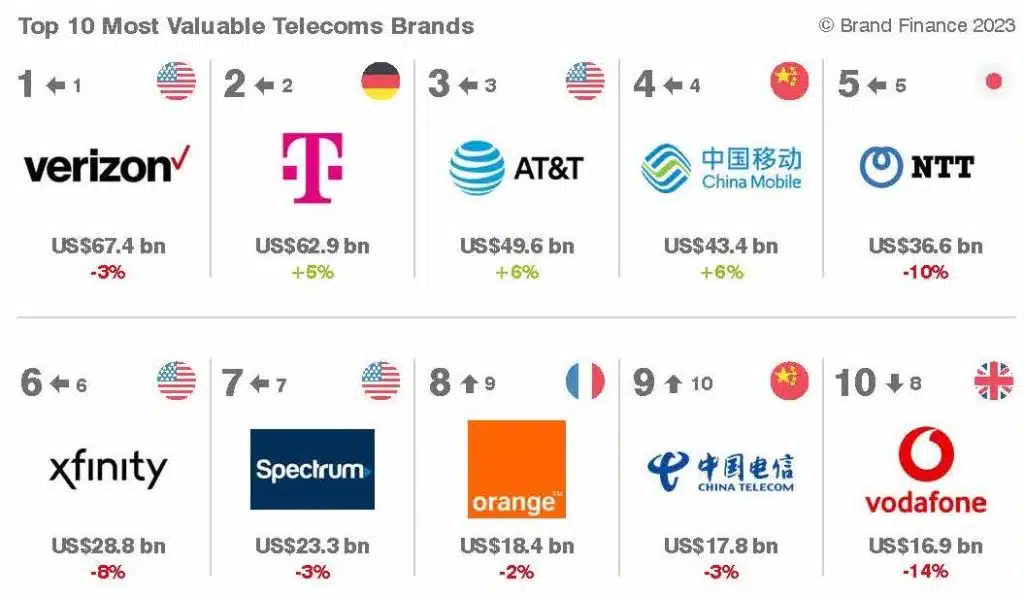
Deutsche Telekom’s reach extends far beyond its European base. The company fosters a global presence through a network of subsidiaries, with the most recognizable brand being T-Mobile. This widely known mobile communications brand operates across several countries, including Austria, the United States (where it is the third-largest mobile carrier), and Germany itself. Through its subsidiaries, Deutsche Telekom caters to a vast clientele exceeding 255.8 million mobile customers, 25.3 million fixed-network customers, and 22.1 million broadband customers, offering a comprehensive suite of telecommunication services that range from mobile voice and data plans to high-speed internet access and cloud solutions for businesses.
At the core of Deutsche Telekom’s success lies its unwavering dedication to progress. The company consistently ranks among Fortune Magazine’s esteemed Global 500 companies by revenue, a feat that speaks volumes about its financial prowess and market influence. In 2023 alone, Deutsche Telekom secured an impressive 79th place on this prestigious list, showcasing its unwavering strength in the competitive telecommunications landscape.
Deutsche Telekom’s commitment extends beyond financial success. The company actively champions the responsible use of technology and fosters a culture of respect within its networks. This dedication is exemplified by its ongoing fight against online hate speech, a cause it passionately promotes to ensure a safe and inclusive online environment for all users.
Deutsche Telekom’s unwavering focus on innovation positions it at the forefront of technological advancements. The company heavily invests in building and expanding its networks, with a goal of making 5G available to 99% of the german population by 2025. Furthermore, Deutsche Telekom actively explores the potential of artificial intelligence (AI) and big data, integrating these cutting-edge technologies into its operations to streamline processes and enhance efficiency. For instance, Deutsche Telekom utilizes AI to optimize network performance and personalize customer service interactions.
Looking towards the future, Deutsche Telekom remains steadfast in its commitment to excellence. As the global telecommunications landscape continues to evolve, Deutsche Telekom is poised to play a pivotal role. Through its unwavering dedication to innovation, a customer-centric approach, and a commitment to social responsibility, Deutsche Telekom is certain to retain its position as a leader in the ever-changing world of telecommunications.
Business Segments of Deutsche Telekom
Deutsche Telekom caters to a wide range of customers with a diverse product portfolio. For individual consumers, Deutsche Telekom offers a comprehensive suite of mobile and fixed-network solutions. This includes traditional voice and data services, along with the latest mobile devices and hardware. Whether you need a reliable mobile plan for staying connected on the go or a high-speed internet connection for your home, Deutsche Telekom has you covered.
Businesses of all sizes can leverage Deutsche Telekom’s robust ICT (Information and Communication Technology) systems. This encompasses a range of services designed to meet the specific needs of multinational corporations and public-sector institutions. From IT outsourcing and business process outsourcing to systems integration and consulting, Deutsche Telekom provides businesses with the tools and expertise they need to operate efficiently and securely. The company also offers a variety of cloud computing and Internet of Things (IoT) solutions, ensuring businesses stay ahead of the curve in today’s ever-evolving technological landscape.
Beyond core telecommunication services, Deutsche Telekom ventures into other complementary offerings. This includes mobile handsets, fixed-line communication services, SmartTV solutions, and wireless communication services. The company additionally provides advertising payment services for media and online shops, showcasing its commitment to innovation and diversification within the industry. This vast product portfolio allows Deutsche Telekom to cater to a wider audience and establish itself as a one-stop shop for all things telecommunication and beyond.
Marketing Strategies of Deutsche Telekom
Deutsche Telekom employs a variety of marketing strategies to maintain its competitive position and expand its market share. These strategies are designed to cater to the diverse needs of its global customer base, spanning both consumer and business segments. Here’s an in-depth look at the marketing strategies of Deutsche Telekom:
1. Brand Positioning and Identity
Deutsche Telekom leverages brand positioning and identity as key parts of its marketing strategy. Their “Leading Digital Telco” strategy emphasizes a consistent brand experience for all customers around the world. This strategy translates into core guidelines that position Deutsche Telekom as: a reliable partner, a facilitator of a better life, a promoter of digital inclusion, a connector to what matters, and a champion against hate speech.
The brand identity itself is built upon a foundation of strong visual and messaging elements. The iconic magenta “T” logo serves as a central image, while a catchy jingle reinforces brand recognition. Beyond these core elements, Deutsche Telekom uses the concept of “digital arteries” to represent their role in connecting people. This is further supported by their offerings of innovative products, services, IT solutions, and even a custom font, “TeleNeo.” Importantly, the brand is designed to resonate with everyone, regardless of age or location.
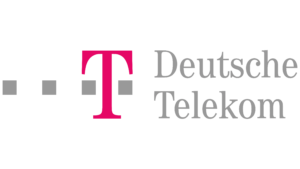
Deutsche Telekom’s brand positioning takes this foundation a step further by focusing on three key areas: promoting participation in the digital world, fostering sustainable practices, and strengthening the bonds of society. By combining a strong brand identity with a clear positioning strategy, Deutsche Telekom aims to establish itself as a leader in the digital age.
2. Product and Service Innovation
Deutsche Telekom prioritizes product and service innovation as a core marketing strategy. The company leverages a three-pronged approach that combines partnerships, internal development, and start-up investment. This strategy allows them to tap into a wide range of expertise and ideas. For instance, Deutsche Telekom utilizes Artificial Intelligence (AI) to drive internal digitalization efforts, seen in their campaign management and the award-winning Frag Magenta chatbot. Furthermore, they foster innovation through hubraum, their start-up program, which connects promising external ventures with their own business units. This collaboration allows them to stay at the forefront of technological advancements.
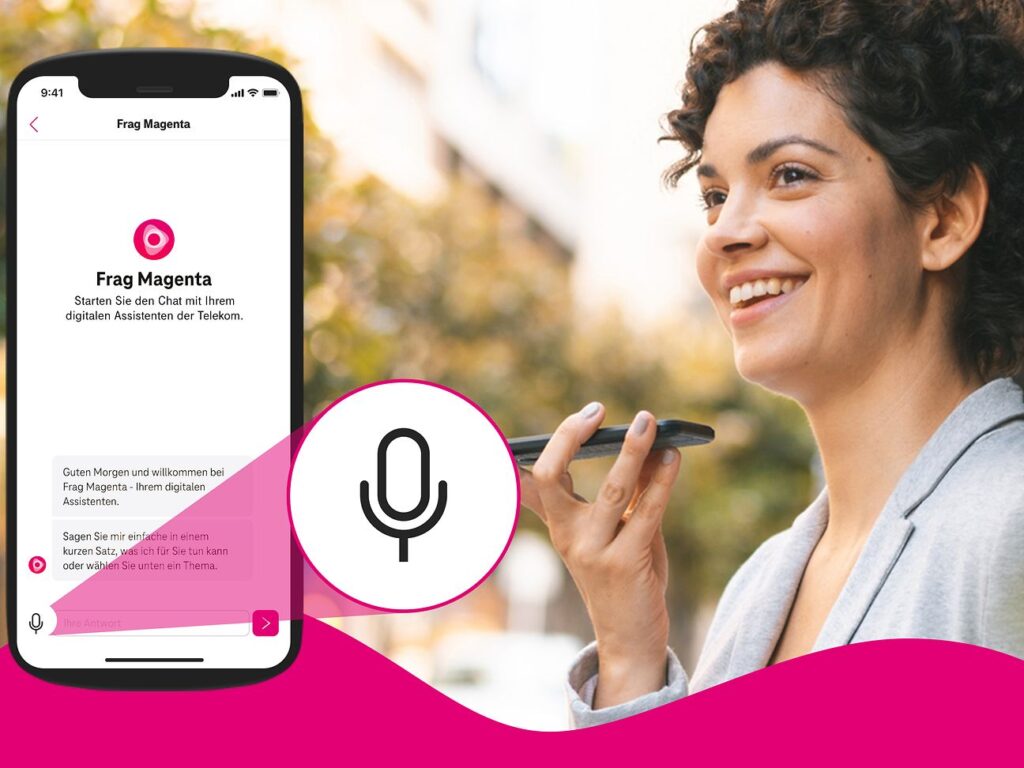
Several examples showcase Deutsche Telekom’s commitment to product and service innovation. One such example is the T Phone and T Phone Pro, mobile devices developed in partnership with Google to leverage Deutsche Telekom’s robust 5G network infrastructure. They’ve also introduced a new version of the T Tablet alongside the T Phone. The Cloud of Things IoT platform is another innovative offering, allowing customers to improve equipment reliability, product development, and service-based business models. Deutsche Telekom is even developing a location-based service that delivers relevant content to customers on the go, at places like train stations, restaurants, and shops. These innovations demonstrate their commitment to providing customers with cutting-edge solutions and a seamless digital experience.
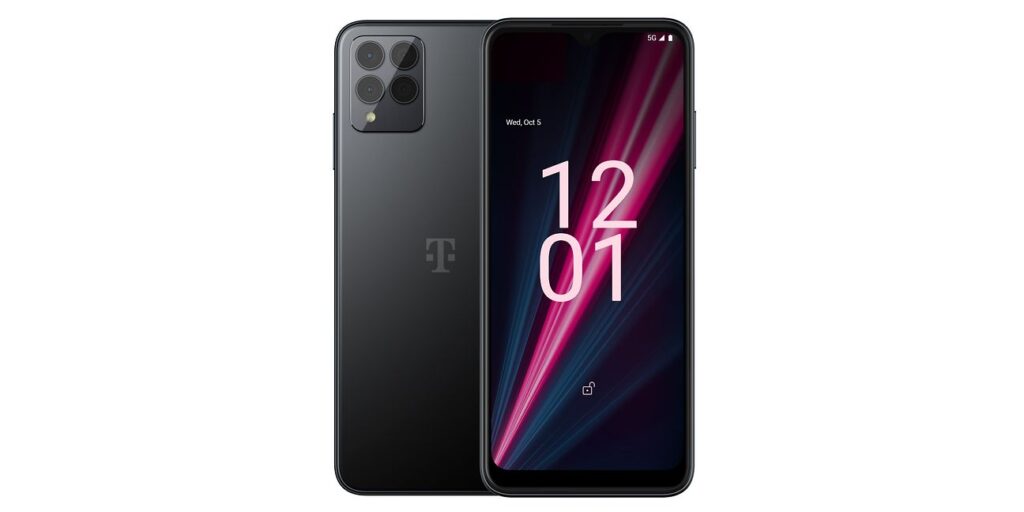
By actively pursuing product and service innovation, Deutsche Telekom aims to differentiate itself in the marketplace and maintain a competitive edge. They understand the importance of staying ahead of the curve and offering solutions that cater to the evolving needs of their customers.
3. Customer-Centric Approach
Deutsche Telekom prioritizes a customer-centric approach as a fundamental marketing strategy. Their core mission is to empower customers to fully participate in a digitalized society through their suite of products and services. This translates into a commitment to providing the best possible network experience, regardless of whether customers utilize fixed line, mobile networks, or alternative access technologies. To achieve this, Deutsche Telekom focuses on three key pillars: operational stability and resilience, exceptional customer experiences, and data-driven decision making.
Deutsche Telekom’s customer-centric approach manifests in several ways. One such example is the “Zero Outage” approach, which prioritizes operational stability and network resilience to minimize disruptions for customers. They also leverage data-driven insights through Rasa’s technology to continuously improve customer service operations. Furthermore, Deutsche Telekom prioritizes fairness, transparency, and loyalty rewards to cultivate trust and build deeper relationships with their customer base. They strive to deliver contextually relevant and personalized products, aiming for seamless interaction between their various offerings. This customer focus even extends to their decision-making structures, which emphasize a “human-centric” approach that prioritizes close proximity to customer needs and desires. By implementing customer experience solutions that deliver value through both the “what” and “how” of their services, Deutsche Telekom aims to solidify its position as a customer-centric leader.
Understanding that digitalization needs vary across different industries, Deutsche Telekom caters to these specificities by offering targeted solutions. These solutions encompass core customer requirements such as advisory services, cloud services, and digital solutions. Additionally, they provide industry-specific solutions for sectors like automotive, healthcare, public sector, and public transport. Through this comprehensive approach, Deutsche Telekom demonstrates its commitment to meeting the unique needs of each customer segment.
4. Strategic Partnerships and Alliances
Deutsche Telekom recognizes the power of strategic partnerships and alliances as a key marketing strategy. By collaborating with industry leaders, they gain access to expertise, resources, and market reach that would be difficult to achieve independently. These partnerships encompass a wide range of areas, from content providers like Netflix to technology innovators like Ericsson. For instance, the partnership with Netflix allows Deutsche Telekom to elevate the entertainment experience for its customers across Europe. Similarly, the collaboration with Ericsson provides developers and enterprises with valuable network APIs. Deutsche Telekom further extends its reach through investment funds like DTCP Growth and DTCP Infra, which focus on high-growth software companies and European digital infrastructure, respectively.
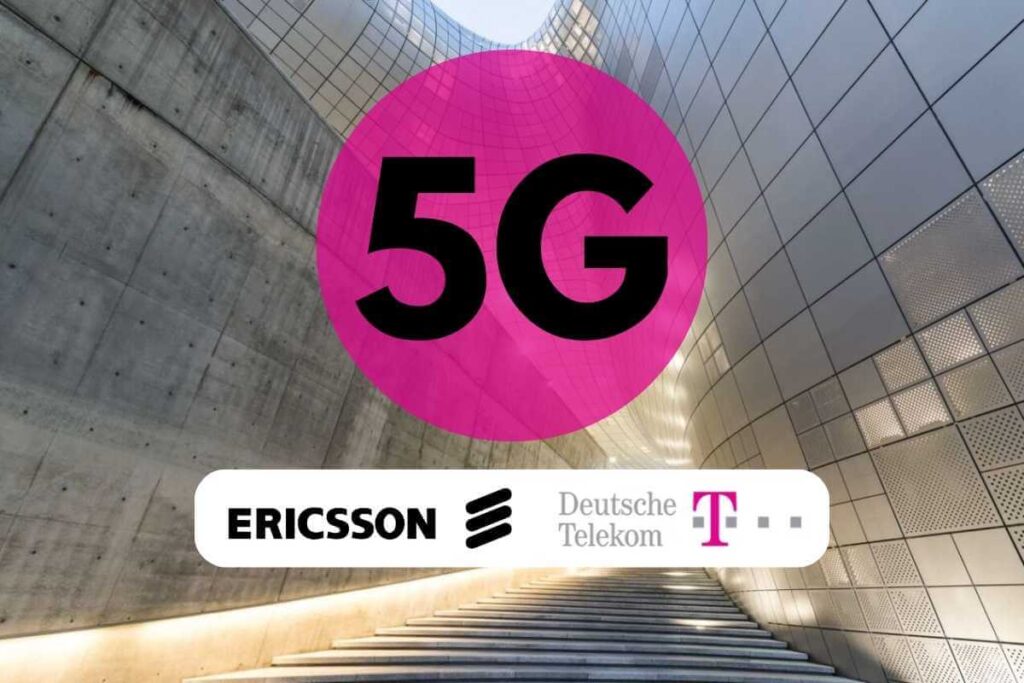
Deutsche Telekom’s alliances demonstrate their commitment to industry-wide collaboration and innovation. The Global Telco AI Alliance, a joint venture with other leading telecom providers, aims to accelerate the adoption of Artificial Intelligence (AI) within their businesses and unlock new market opportunities. The Joint Alliance for CSR, co-founded by Deutsche Telekom, exemplifies their dedication to corporate social responsibility by establishing best practices and fostering collaboration in this crucial area. Looking beyond the telecom industry, Deutsche Telekom’s partnership with Equativ strengthens their position in the German targeted TV advertising market through programmatic marketing. Historical alliances, such as the one with Lagardère, which enabled T-Online International to enter the French market, highlight their ability to leverage partnerships for strategic expansion. Deutsche Telekom’s membership in the World Alliance further underscores their commitment to global cooperation and industry leadership.
Through this multifaceted approach to strategic partnerships and alliances, Deutsche Telekom positions itself at the forefront of innovation and market growth. By collaborating with key players, they gain access to a wider range of capabilities and resources, ultimately allowing them to deliver a more comprehensive and competitive offering to their customers.
5. Digital Transformation
Deutsche Telekom (DT) prioritizes digital transformation as a core pillar of its marketing strategy. This strategy revolves around leveraging technology to empower customers, optimize operations, and drive growth. It encompasses several key areas, all designed to solidify DT’s position as a leader in the digital age.
One crucial aspect of their strategy is network investment. This ensures more customers can seamlessly participate in the digital world. DT focuses on both building and operating robust networks, ensuring a smooth and unified experience across fixed-line and mobile services. Furthermore, they actively invest in digitalizing their products and internal processes. This allows them to deliver solutions that cater to the evolving needs of customers in an increasingly digitalized society. Social responsibility is another key tenet of their digital transformation strategy. This translates into aligning business practices with environmental and climate protection efforts.
DT’s digital transformation extends beyond core network infrastructure. Convergence, the bundling of various network, communication, and IT technologies, plays a significant role. This allows them to offer customers comprehensive solutions that cater to their diverse needs. Network modernization and expansion are also critical aspects of their strategy. By actively modernizing their network and expanding coverage faster than any other competitor in Germany, DT demonstrates its commitment to providing a future-proof infrastructure for its customers. The “Cloud of Things” IoT platform further exemplifies their focus on innovation. This platform empowers businesses to improve equipment reliability, accelerate product development, and adopt new service-based business models, all while leveraging the power of the Internet of Things.
Looking ahead, DT’s Telekom Deutschland (TDG) group is establishing a new business area dedicated to digital solutions and platforms. This area will focus on a range of offerings, including end-to-end digital solutions, core connectivity platforms, near-to-connectivity platforms, and software skills development. This strategic move underscores DT’s commitment to continuous digital transformation and its aim to be a leader in providing cutting-edge solutions for the digital landscape.
6. Sustainability and Corporate Responsibility
Deutsche Telekom leverages sustainability and corporate responsibility (CSR) as a key marketing strategy. Their CSR strategy, focused on environment, society, and governance, positions them as a leader in responsible business practices. Their 2022 sustainability report outlines ambitious goals in each of these areas. For instance, they aim to connect more people to eco-friendly networks, empower customers to adopt sustainable habits, and achieve a circular economy for network technology and devices by 2030. Beyond environmental targets, Deutsche Telekom champions social responsibility by actively combating discrimination and hate speech online, while also using digital solutions to help customers reduce their carbon footprint.
Their commitment to CSR extends to a broader range of sustainability initiatives. Data security, privacy, human rights within their supply chain, sustainable financial practices, social engagement, and responsible employer practices are all central to their strategy. To raise awareness of these efforts, Deutsche Telekom uses the #GreenMagenta and #GoodMagenta labels to highlight initiatives that protect the environment, conserve resources, or address social challenges in the digital world. A prime example of their success is achieving their 2021 climate target of sourcing 100% of electricity from renewable sources, while simultaneously investing €18 billion in network expansion to promote digital inclusion for all.
By weaving sustainability and social responsibility into the core fabric of their marketing strategy, Deutsche Telekom appeals to a growing segment of customers who prioritize ethical and environmentally conscious businesses. This approach not only strengthens their brand image but also positions them as a leader in responsible innovation within the telecommunications industry.
7. Marketing Communications
Deutsche Telekom effectively utilizes integrated marketing communications (IMC) as a key marketing strategy. IMC involves using a variety of promotional channels in a unified and complementary way to deliver a consistent brand message across all touchpoints. A strong example of this is their campaign to promote the Lenz app, targeting millennials.
This campaign strategically placed eye-catching magenta elements throughout the physical world, including landmarks and benches. These elements, when viewed through the Lenz app using chroma-key technology, unlocked exclusive Gorillaz content. This campaign successfully merged physical and digital marketing channels, with the real-world magenta elements sparking curiosity and driving users to download the Lenz app. The app itself served as the platform to deliver the desired content, creating a seamless and engaging brand experience.

This IMC strategy demonstrates Deutsche Telekom’s understanding of how to reach their target audience. By strategically placing the magenta triggers in millennial frequented spaces and leveraging the app as the content delivery point, they ensured their message resonated with the right demographic in a way that was both relevant and engaging. This approach exemplifies the power of IMC in creating a cohesive and impactful brand experience.
8. Market Expansion and Acquisition
Deutsche Telekom utilizes market expansion and acquisitions as a strategic element within their overall marketing strategy.
One key example is their investment in Teridion, an Israeli software company. This strategic investment suggests a focus on acquiring expertise in specific areas that align with their growth objectives. In contrast, the sale of a majority stake in GD Towers highlights their willingness to divest non-core assets to streamline operations and potentially free up capital for future acquisitions. Their past acquisition of VoiceStream Wireless, which marked their entry into the US market and creation of T-Mobile US, demonstrates the potential for acquisitions to propel them into new markets and drive significant growth.
Looking towards the future, Deutsche Telekom’s CEO’s comments regarding a potential €2 billion allocation for acquisitions in areas like IoT, security, and next-generation enterprise networking solidify their focus on targeted acquisitions as a key driver of market expansion. By strategically acquiring companies with complementary strengths in these high-growth areas, Deutsche Telekom aims to bolster its competitive edge and position itself for continued success in the evolving telecommunications landscape.
Deutsche Telekom’s marketing strategies are multifaceted, focusing on innovation, customer-centricity, digital transformation, and sustainability. By continuously adapting to market trends and customer needs, the company maintains its leadership position in the global telecommunications industry.
Marketing Mix of Deutsche Telekom
Deutsche Telekom utilizes the marketing mix (4Ps) extensively to reach its target audience. Let’s delve into each of the 4Ps to understand how Deutsche Telekom crafts its marketing strategy:
1. Product:
Variety: Deutsche Telekom offers a vast array of products encompassing mobile phone contracts, fixed-line internet plans, TV packages, and MagentaTV streaming services. They cater to individual consumers, families, and businesses.
Innovation: The company prioritizes staying ahead of the curve. They invest heavily in research and development, offering cutting-edge 5G technology, high-speed internet connections, and constantly upgrading their services.
Bundling: Deutsche Telekom understands the customer desire for convenience and value. They offer bundled packages that combine mobile, internet, and TV services at competitive prices. This encourages customers to sign up for multiple services and creates a sticky ecosystem.
Service Focus: Beyond just connectivity, Deutsche Telekom focuses on excellent customer service. They offer technical support, online troubleshooting tools, and user-friendly interfaces for their products.
2. Price:
Segmentation: Deutsche Telekom uses a segmentation strategy in pricing. They offer various plans with different price points catering to different budgets and usage needs. Students might get lower data allowances at a cheaper price, while high-volume business users have premium plans with unlimited data.
Value Pricing: Deutsche Telekom emphasizes the value proposition of their offerings. They highlight the benefits of bundled packages, superior network quality, and excellent customer service to justify their pricing strategy.
Promotions and Discounts: The company understands the competitive landscape and offers promotions and discounts to attract new customers and retain existing ones. These might include limited-time offers, free trials, or loyalty programs with reward points.
3. Place (Distribution):
Direct Sales: Deutsche Telekom operates physical stores across Germany where customers can interact with representatives, ask questions, and get personalized recommendations on plans and devices.
Online Sales: The company emphasizes a strong online presence with a user-friendly website for purchasing plans, managing accounts, and accessing customer support.
Partner Networks: Deutsche Telekom leverages partnerships with electronics retailers and mobile phone stores to expand their reach and make their products readily available to a wider audience.
4. Promotion:
Traditional Advertising: Deutsche Telekom utilizes traditional media like television commercials and print advertising to reach a broad audience and create brand awareness.
Digital Marketing: They have a strong digital marketing presence with targeted online advertising, social media engagement, and influencer marketing to connect with tech-savvy customers.
Public Relations: Deutsche Telekom actively cultivates positive media relations by highlighting their technological advancements, community involvement, and commitment to sustainability.
Sponsorship: The company sponsors major sporting events and cultural initiatives to enhance brand visibility and establish itself as a reliable and trustworthy telecommunications provider.
By effectively using these elements, Deutsche Telekom positions itself as a leading telecommunications provider, offering innovative products, competitive pricing, convenient access, and a commitment to customer satisfaction.
Also Read: A Deep Dive into the Marketing Strategies of T-Mobile
To read more content like this, subscribe to our newsletter





